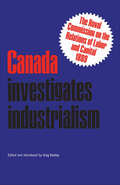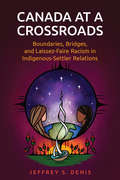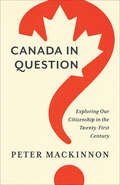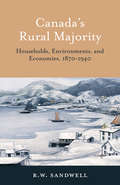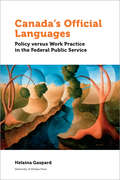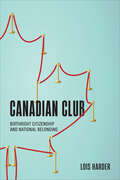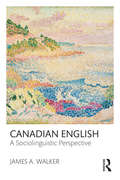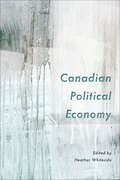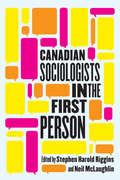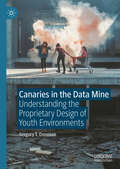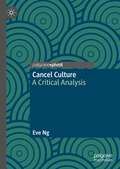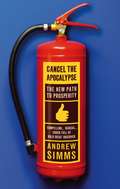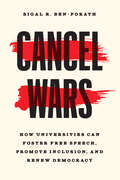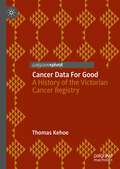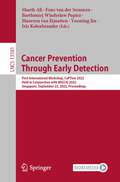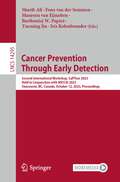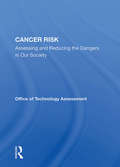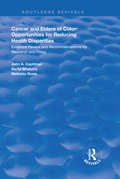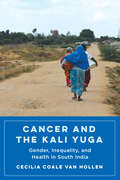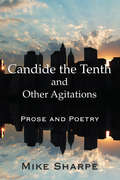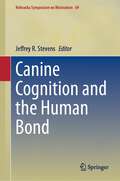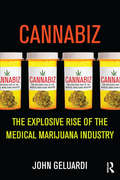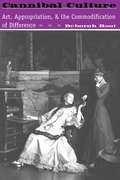- Table View
- List View
Canada Investigates Industrialism: The Royal Commission on the Relations of Labor and Capital, 1889 (Abridged)
by Gregory S. KealeyIn the 1880s Canadians began to cope with the meaning of their emerging industrial society. During that decade the federal government first investigated industrial conditions and provincial governments passed Canada's first factory legislation. The same period saw the resurgence of an articulate and angry labor movement protesting against the excesses of modern industry. Through the Royal Commission on the Relations of Labor and Capital we can perhaps gain our best insight into the everyday world of workers and capitalists in late nineteenth-century Canada. The commission gathered evidence in Ontario, Quebec, Nova Scotia, and New Brunswick and talked to thousands of workers, businessmen, and other concerned citizens. This edited version of its investigation includes much of the best testimony; it describes working class living conditions, the emergence of organized labor, and the attitudes of businessmen to industrial capitalism. The testimony takes us with the commissioners on their tour of New Brunswick cotton mills, Capre Breton coal pits, Ontario shops and foundries, and Quebec City wharves; it explores as well the darkest corners of Montreal cigar factories. Industrialists discuss profits, markets, sources of raw material, and problems with labor. But what is perhaps more important, the working people themselves are also heard, men and women who in most historical records appear as little more than cold statistics. The warmth and humanity of these Canadians reflecting on their lives and on the society around them bring the commission documents to life. Aging craftsmen, ten-year-old saw-mill hands, girls from the spindles and looms, describe their workplaces, wages, hours, and aspects of their lives away from the job. These almost unique interviews allow us to enter their intellectual and cultural world – to learn of their past and present and of some of their hopes and aspirations. The Labor Commission reports and testimony are essential for an understanding of the Canadian working class as it was being transformed by the new techniques of industrial production.
Canada at a Crossroads: Boundaries, Bridges, and Laissez-Faire Racism in Indigenous-Settler Relations
by Jeffrey DenisDrawing on group position theory, settler colonial studies, critical race theory, and Indigenous theorizing, Canada at a Crossroads emphasizes the social psychological barriers to transforming white settler ideologies and practices and working towards decolonization. After tracing settlers’ sense of group superiority and entitlement to historical and ongoing colonial processes, Denis illustrates how contemporary Indigenous and settler residents think about and relate to one another. He highlights how, despite often having close cross-group relationships, residents maintain conflicting perspectives on land, culture, history, and treaties, and Indigenous residents frequently experience interpersonal and systemic racism. Denis then critically assesses the promise and pitfalls of commonly proposed solutions, including intergroup contact, education, apologies, and collective action, and concludes that genuine reconciliation will require radically restructuring Canadian society and perpetually fulfilling treaty responsibilities.
Canada in Question: Exploring Our Citizenship in the Twenty-First Century (UTP Insights)
by Peter MacKinnonExploring pressing questions around Canadian citizenship, Canada in Question delves into contemporary issues that come into play in identifying what it means to be Canadian. Beginning with an update on the status of Canadian citizenship, Peter MacKinnon acknowledges that with the exception of Indigenous peoples, most Canadians migrated to Canada in the last 400 years. In surveying the status of citizenship, the author addresses the impact of these newcomers on Indigenous peoples, and the subsequent impression that the following influx of new immigrants and migrants has had on citizenship. MacKinnon investigates the ties that bind Canadians to their country and to their fellow citizens, and how these ties are often challenged by global influences, such as identity politics and social media. Shedding light on the connection between economic opportunity and citizenship, and on the institutional context in which differences must be accommodated, Canada in Question examines current circumstances and new challenges, and looks to the unique future of Canadian citizenship.
Canada's Rural Majority: Households, Environments, and Economies, 1870-1940
by R. W. SandwellBefore the Second World War, Canada was a rural country. Unlike most industrializing countries, Canada's rural population grew throughout the century after 1871 - even if it declined as a proportion of the total population. Rural Canadians also differed in their lives from rural populations elsewhere. In a country dominated by a harsh northern climate, a short growing season, isolated households and communities, and poor land, they typically relied on three ever-shifting pillars of support: the sale of cash crops, subsistence from the local environment, and wage work off the farm.Canada's Rural Majority is an engaging and accessible history of this distinctive experience, including not only Canada's farmers, but also the hunters, gardeners, fishers, miners, loggers, and cannery workers who lived and worked in rural Canada. Focusing on the household, the environment, and the community, Canada's Rural Majority is a compelling classroom resource and an invaluable overview of this understudied aspect of Canadian history.
Canada’s Official Languages: Policy Versus Work Practice in the Federal Public Service (Politics and Public Policy)
by Helaina GaspardCanada’s official languages legislation fundamentally altered the composition and operational considerations of federal institutions. With legislative change, Canada’s public service has achieved the equitable representation of its two official languages groups, provided services to the public in both official languages, and has codified rights for public servants to work in their official language of choice. On paper, the regime is robust. In practice, there is a persistent divergence between policy and practice, as English dominates as the regular language of work in the federal public service. Through an historical institutionalist lens based on extensive archival research and semi-structured interviews, Gaspard shows that the implementation of official languages policy in the federal public service from 1967–2013 could not challenge the predominance of English as the operating language of the federal public service. The analysis of the roles of actors, ideas and institutions that influenced the policy implementation process show that a lack of structural change, inadequate managerial engagement, and a false sense that both official languages are equally ingrained in the public service explain the persistence of English as the dominant language of work.
Canadian Club: Birthright Citizenship and National Belonging
by Lois HarderBirth-based citizenship is widely considered to be the most secure claim to political belonging. Despite the general belief that liberal democracies are formed through consent, in fact, most people are members of a political community by virtue of the circumstances of their birth. In Canadian Club, Lois Harder tracks the development of Canada’s Citizenship Act from its first iteration in 1947 to the provisions governing the citizenship of children born abroad to Canadian parents with the assistance of reproductive technologies. Reviewing a range of cases, Harder reveals how membership in the Canadian political community relies on norms surrounding gender, family, and sexuality, as well as presumptions regarding the constitution of "authentic" national identity, racial hierarchy, and the rightness of settler colonialism. Canadian Club concludes with a consideration of alternative approaches to forming political communities. Ultimately, it asks whether birth-based citizenship is the best we can do and what a more democratic and socially just alternative might look like.
Canadian English: A Sociolinguistic Perspective
by James A. WalkerThis textbook is the only one of its kind to introduce the study of Canadian English in the context of basic concepts of linguistics and sociolinguistics. The book provides foundational information on linguistic principles and on the different branches of sociolinguistics, ranging from the large-scale ‘macro’ study of language usage (the sociology of language, dialect surveys) to the ‘micro’ study of language use (sociophonetics, sociolinguistic variation and change). Each chapter highlights the different ways of collecting and analyzing data, including census data and historical texts, surveys and questionnaires, publically available corpora, and interviews. Mini-projects at the end of each chapter offer hands-on experience with the methods presented in the chapter. In addition to discussing the classic works in the study of Canadian English, this book engages with such contemporary issues as new-dialect formation, language and social identity, and ongoing language change, making it key reading for students taking courses in the areas of Canadian English, varieties of English, language variation, and sociolinguistics.
Canadian Political Economy
In Canadian Political Economy, experts from a number of disciplinary backgrounds come together to explore Canada’s empirical political economy and the field's contributions to theory and debate. Considering both historical and contemporary approaches to CPE, the contributors pay particular attention to key actors and institutions, as well as developments in Canadian political-economic policies and practices, explored through themes of changes, crises, and conflicts in CPE. Offering up-to-date interpretations, analyses, and descriptions, Canadian Political Economy is accessibly written and suitable for students and scholars. Through 17 chapters, the book’s topics include theory, history, inequality, work, free trade and fair trade, co-operatives, banking and finance, the environment, indigeneity, and the gendered politics of political economy. Linking longstanding debates with current developments, this volume represents both a state-of-the-discipline and a state-of-the-art contribution to scholarship.
Canadian Sociologists in the First Person
by Stephen Harold Riggins and Neil McLaughlinSocial scientists' autobiographies can yield insight into personal commitments to research agendas and the very project of social science itself. But despite the long history of life writing, sociologists have tended to view the practice with skepticism.Canadian Sociologists in the First Person is the first book to survey the Canadian sociological imagination through personal recollections. Exploring the lives and experiences of twenty contributors from across the country, this book connects the unique and shared features of their careers to broad social dynamics while providing a guide to their own research and administrative contributions to their universities, their profession, and their broader society and communities. The contributors teach in different types of institutions, are prominent in the discipline and in their specializations, and represent significant and diverse intellectual currents, political perspectives, and life and career experiences.Aiming to start a broad conversation about what social science and the academic profession look like in Canada from an insider's perspective, Canadian Sociologists in the First Person offers invaluable lessons for younger scholars as they envision a diverse sociological imagination for the twenty-first century.
Canadian Studies in the New Millennium, Second Edition
by Patrick James Mark J. KasoffThis popular textbook offers a thorough and accessible approach to Canadian Studies through comparative analyses of Canada and the United States, their histories, geographies, political systems, economies, and cultures. Students and professors alike acknowledge it as an ideal tool for understanding the close relationship between the two countries, their shared experiences, and their differing views on a range of issues.Fully revised and updated, the second edition of Canadian Studies in the New Millennium includes new chapters on Demography and Immigration Policy, the Environment, and Civil Society and Social Policy, all written by leading scholars and educators in the field. At a time in which there is a growing mutual dependence between the US and Canada for security, trade, and investment, Canadian Studies in the New Millennium will continue to be a valuable resource for students, educators, and practitioners on both sides of the border.
Canaries in the Data Mine: Understanding the Proprietary Design of Youth Environments
by Gregory T. DonovanCanaries in the Data Mine offers an account of the lived experiences and cultural expectations of young people growing up in digital environments increasingly owned by others and designed for profit. At the book’s core is a participatory research project that first interviewed New York City teens about their digital habits and then engaged a group of five young people in designing the prototypical platform of their time: a social network. In this engaging book, Gregory T. Donovan penetrates beyond the interface to consider the digital geography of contemporary youth, arguing that understanding what young people are grappling with portends what is, or will soon be, felt by society at large. Drawing from in-depth interviews and design workshops, he shows how informational capitalism is reproduced at an intimate scale as well as how involving young people in digital design can foster capacities for reworking and resisting the conditions of a rising rentier society.
Cancel Culture: A Critical Analysis
by Eve Ng“Cancel culture” has become one of the most charged concepts in contemporary culture and politics, but mainstream critiques from both the left and the right provide only snapshots of responses to the phenomenon. Takinga media and cultural studies perspective, this book traces the origins of cancel practices and discourses, and discusses their subsequent evolution within celebrity and fan cultures, consumer culture, and national politics in the U.S. and China. Moving beyond popular press accounts about the latest targets of cancelling or familiar free speech debates, this analysis identifies multiple lineages for both cancelling and criticisms about cancelling, underscoring the various configurations of power associated with “cancel culture” in particular cultural and political contexts.
Cancel The Apocalypse: The New Path To Prosperity
by Andrew SimmsEver get the feeling that things are falling apart? You're not alone. From bad banks to global warming it can all look hopeless, but what if everything could turn out, well, even better than before? What if the only thing holding us back is a lack of imagination and a surplus of old orthodoxies? In fascinating and iconoclastic detail - on everything from the cash in your pocket to the food on your plate and the shape of our working lives - Cancel the Apocalypse describes how the relentless race for economic growth is not always one worth winning, how excessive materialism has come at a terrible cost to our environment, and hasn't even made us any happier in the process. Simms believes passionately in the human capacity for change, and shows how the good life remains in our grasp. While global warming and financial meltdown might feel like modern day horsemen of the apocalypse, Simms shows how such end of the world scenarios offer us the chance for a new beginning.
Cancel The Apocalypse: The New Path To Prosperity
by Andrew SimmsEver get the feeling that things are falling apart? You're not alone. From bad banks to global warming it can all look hopeless, but what if everything could turn out, well, even better than before? What if the only thing holding us back is a lack of imagination and a surplus of old orthodoxies? It's a topsy-turvy world in which a country can import the same amount of ice-cream, toilet paper and other goods to trading partners as it exports, and where top bankers are paid millions for destroying economic value, while hospital cleaners create value many times their pay. In fascinating and iconoclastic detail - on everything from the cash in your pocket to the food on your plate and the shape of our working lives - Cancel the Apocalypse describes how the relentless race for economic growth is not always one worth winning, how excessive materialism has come at a terrible cost to our environment, and hasn't even made us any happier in the process. Simms believes passionately in the human capacity for change, and shows how the good life remains in our grasp. While global warming and financial meltdown might feel like modern day horsemen of the apocalypse, Simms shows how such end of the world scenarios offer us the chance for a new beginning.
Cancel Wars: How Universities Can Foster Free Speech, Promote Inclusion, and Renew Democracy
by Sigal R. Ben-PorathAn even-handed exploration of the polarized state of campus politics that suggests ways for schools and universities to encourage discourse across difference. College campuses have become flashpoints of the current culture war and, consequently, much ink has been spilled over the relationship between universities and the cultivation or coddling of young American minds. Philosopher Sigal R. Ben-Porath takes head-on arguments that infantilize students who speak out against violent and racist discourse on campus or rehash interpretations of the First Amendment. Ben-Porath sets out to demonstrate the role of the university in American society and, specifically, how it can model free speech in ways that promote democratic ideals. In Cancel Wars, she argues that the escalating struggles over “cancel culture,” “safe spaces,” and free speech on campus are a manifestation of broader democratic erosion in the United States. At the same time, she takes a nuanced approach to the legitimate claims of harm put forward by those who are targeted by hate speech. Ben-Porath’s focus on the boundaries of acceptable speech (and on the disproportional impact that hate speech has on marginalized groups) sheds light on the responsibility of institutions to respond to extreme speech in ways that proactively establish conversations across difference. Establishing these conversations has profound implications for political discourse beyond the boundaries of collegiate institutions. If we can draw on the truth, expertise, and reliable sources of information that are within the work of academic institutions, we might harness the shared construction of knowledge that takes place at schools, colleges, and universities against truth decay. Of interest to teachers and school leaders, this book shows that by expanding and disseminating knowledge, universities can help rekindle the civic trust that is necessary for revitalizing democracy.
Cancer Data For Good: A History of the Victorian Cancer Registry
by Thomas KehoeThis book examines the history of the Victorian Cancer Registry (VCR) in Australia from its establishment in the late 1930s through to the present day. It sheds new light on the history of medicine and the broader social and cultural histories affected by advances in cancer control science, providing a historical account of cancer registration that is empirically grounded in new archival and oral sources. It addresses the obstacles that proponents of cancer registration faced, how governments came to support permanent registries, and the subsequent contributions of the VCR and other registries to cancer research. In charting this history, the book discusses some of the political, social, and cultural implications of registry-driven science, and the links between developments in scientific knowledge and campaigning for policy changes around cancer.
Cancer Prevention Through Early Detection: First International Workshop, CaPTion 2022, Held in Conjunction with MICCAI 2022, Singapore, September 22, 2022, Proceedings (Lecture Notes in Computer Science #13581)
by Sharib Ali Fons van der Sommen Bartłomiej Władysław Papież Maureen Van Eijnatten Yueming Jin Iris KolenbranderThis book constitutes the refereed proceedings of the first International Workshop on Cancer Prevention through Early Detection, CaPTion, held in conjunction with the 25th International Conference on Medical Imaging and Computer-Assisted Intervention, MICCAI 2022, in Singapore, Singapore, in September 2022. The 16 papers presented at CaPTion 2022 were carefully reviewed and selected from 21 submissions. The workshop invites researchers to submit their work in the field of medical imaging around the central theme of early cancer detection, and it strives to address the challenges that are required to be overcomed to translate computational methods to clinical practice through well designed, generalizable (robust), interpretable and clinically transferable methods.
Cancer Prevention Through Early Detection: Second International Workshop, CaPTion 2023, Held in Conjunction with MICCAI 2023, Vancouver, BC, Canada, October 12, 2023, Proceedings (Lecture Notes in Computer Science #14295)
by Bartłomiej W. Papież Sharib Ali Fons van der Sommen Maureen Van Eijnatten Yueming Jin Iris KolenbranderThis book constitutes the refereed proceedings of the second International Workshop on Cancer Prevention through Early Detection, CaPTion, held in conjunction with the 26th International Conference on Medical Imaging and Computer-Assisted Intervention, MICCAI 2023, in Vancouver, Canada, in October 2023.The 11 papers presented at CaPTion 2023 were carefully reviewed and selected from 12 submissions. The workshop invites researchers to submit their work in the field of medical image analysis around the central theme of cancer and early cancer detection, progression, inflammation understanding, multimodality data, and computer-aided navigation.
Cancer Risk: Assessing And Reducing The Dangers In Our Society
by Office of Technology AssessmentCongressional interest in cancer is long standing and continuing. Programs in basic cancer research, and in treatment and prevention of the disease are now complemented by some two dozen laws directed at reducing exposures to cancer-causing substances. This report examines the technologies used to gather and analyze information about cancer in our
Cancer and Elders of Color: Evidence Review and Recommendations for Research and Policy (Routledge Revivals)
by John A. CapitmanOriginally published in 2005. The prevention, detection and treatment of cancer has received enormous scientific and clinical attention in the US and in other developed countries. However, there has been no comprehensive review of the racial/ethnic disparities in cancer among elders, nor the opportunities for cancer prevention within the Medicare population. In this important work, John A. Capitman, Sarita Bhalotra and Mathilda Ruwe address this deficiency. The evidence report summarized in this book offers systematic syntheses of prior published research and qualitative assessments of emerging approaches in order to illustrate and clarify some of the debates surrounding cancer disparities. Based on a large-scale US government-funded review of existing literature and case studies of model programs by a multidisciplinary team, this key work: * Provides a comprehensive approach to cancer etiology and prevalence among older people; * Integrates genetic, epidemiological, medical care, health services research and social science interpretive frames and current knowledge for cancer control; * Explores existing research on reduction in cancer risks through lifestyle modification and the potential applicability of this research to elders of color; * Explores the implementation experiences of model programs to reduce cancer care inequalities * Develops a conceptual framework of cancer detection and treatment systems across multiple anatomical cancer sites; * Examines opportunities for screening, treatment and follow-up service enhancement for elders of color; * Fills gaps in current published systematic reviews with respect to older people.
Cancer and the Kali Yuga: Gender, Inequality, and Health in South India
by Cecilia Coale Van HollenAs news spread that more women died from breast and cervical cancer in India than anywhere else in the world in the early twenty-first century, global public health planners accelerated efforts to prevent, screen, and treat these reproductive cancers in low-income Indian communities. Cancer and the Kali Yuga reveals that women who are the targets of these interventions in Tamil Nadu, South India, hold views about cancer causality, late diagnosis, and challenges to accessing treatment that differ from the public health discourse. Cecilia Coale Van Hollen's critical feminist ethnography centers and amplifies the voices of Dalit Tamil women who situate cancer within the nexus of their class, caste, and gender positions. Dalit women's narratives about their experiences with cancer present a powerful and poignant critique of the sociocultural and political-economic conditions that marginalize them and jeopardize their health and well-being in twenty-first-century India.
Candide the Tenth and Other Agitations: Prose and Poetry
by Myron E. SharpeIn the stories and poetry that comprise 'Other Agitations, ' Mike Sharpe's ingathering of history, economics, literature, and philosophy richly informs his satire. Franz Kafka, Jane Austen and Ernest Hemingway, Bernard Shaw, Isaac Bashevis Singer and Emily Dickinson serve as 'agitators.' Sharpe rewrites familiar tales creating new originals in his unique style and weltanschauung. Truth, in human hands, becomes conditional
Canine Cognition and the Human Bond (Nebraska Symposium on Motivation #69)
by Jeffrey R. StevensDogs are a valued part of millions of households worldwide. They also serve many functions in human societies from herding livestock to detecting drugs, explosives, or illegal wildlife to providing physical assistance or emotional support to those in need. Yet, in terms of behavior and cognition, dogs have only become a serious subject of scientific study in the last 20 years. Similarly, we have recently witnessed a sharp increase in studies of canine-human interaction, exploring the motivational, emotional, cognitive, physiological, and neural mechanisms of dogs on human psychology and well-being. This book is a collection of chapters stemming from the Nebraska Symposium on Motivation, which focused on Canine Cognition and the Human Bond. The primary goal of this symposium was to bring together researchers from psychology, biology, neuroscience, and anthropology to delve deeper into the canine-human bond. These chapters describe the current state of knowledge from international experts in the fields of canine cognition and canine-human interaction. Bridging these two areas can help us better understand the canine-human bond, potentially improving the lives of both dogs and people.
Cannabiz: The Explosive Rise of the Medical Marijuana Industry
by John GeluardiCannabiz tells one the most important political and business stories of our generation: the transformation of a counterculture movement into a growth industry with staggering potential. Charting the rise of medical marijuana in California and 14 other states, award-winning journalist John Geluardi vividly recounts the movement’s early activism, its legal challenges and victories, and its emergence as a commercial and political force.Tracing the history of marijuana in the United States, Cannabiz also reports on the industry’s key players, political allies and opponents, internal strife, and audacious aspirations—including a 2010 ballot initiative to legalize the adult use of marijuana in California. Along the way, Geluardi describes local efforts to regulate dispensaries, ranging from workable ordinances in some cities to bureaucratic paralysis in Los Angeles, where dispensaries came to outnumber McDonalds franchises. He also reports on efforts in Humboldt County, the heartland of marijuana cultivation, to keep pot illegal—and prices high. Adroitly profiling this unique industry, Cannabiz tells a distinctively American story—one whose colorful characters and fascinating details evoke Prohibition and the Gold Rush.
Cannibal Culture: Art, Appropriation, and the Commodification of Difference (Icon Editions)
by Deborah RootIn Arizona, a white family buys a Navajo-style blanket to be used on the guest-room bed. Across the country in New York, opera patrons weep to the death scene of Madam Butterfly. These seemingly unrelated events intertwine in Cannibal Culture as Deborah Root examines the ways Western art and Western commerce co-opt, pigeonhole, and commodify so-called “native experiences.” From nineteenth-century paintings of Arab marauders to our current fascination with New Age shamanism, Root explores and explodes the consumption of the Other as a source of violence, passion, and spirituality. Through advertising images and books and films like The Sheltering Sky, Cannibal Culture deconstructs our passion for tourism and the concept of “going native,” while providing a withering indictment of a culture in which every cultural artifact and ideology is up for grabs—a cannibal culture. This fascinating book raises important and uncomfortable questions about how we travel, what we buy, and how we determine cultural merit. Travel—be it to another country, to a museum, or to a supermarket—will never be the same again.
